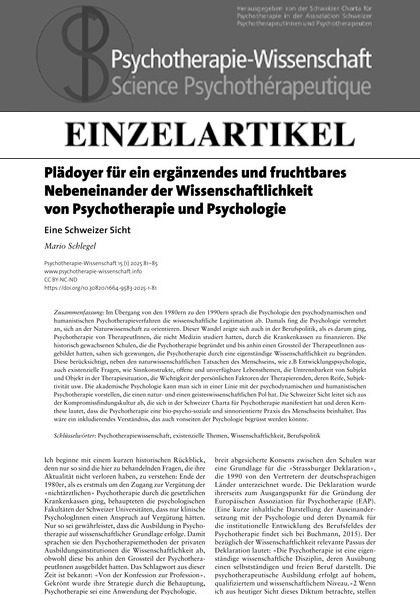Argument for a complementary and productive coexistence of the scientific nature of psychotherapy and psychology
A Swiss perspective
DOI:
https://doi.org/10.30820/1664-9583-2025-1-81Keywords:
Psychotherapiewissenschaft, existenzielle Themen, Wissenschaftlichkeit, BerufspolitikAbstract
In the transition from the 1980s to the 1990s, psychology denied the scientific legitimacy of psychodynamic and humanistic psychotherapy methods. At that time, psychology increasingly began to orient itself towards the natural sciences. This change was also reflected in professional policy when it came to health insurance funding for psychotherapy by therapists who had not studied medicine. The historically established schools, which had founded psychotherapy and had trained the majority of therapists up to that point, felt compelled to justify psychotherapy through an independent scientific approach. In addition to the scientific facts of being human, such as developmental psychology, this also takes into account existential issues such as constructs of meaning, open and unavailable life issues, the inseparability of subject and object in the therapy situation, the importance of the personal factors of the therapist, their maturity, subjectivity, etc. Academic psychology can be seen as being in line with psychodynamic and humanistic psychotherapy, which has a natural science and a humanistic pole. The Swiss view is derived from the culture of compromise that has manifested itself in the Swiss Charter for Psychotherapy and whose core thesis is that psychotherapy involves a bio-psycho-social and meaning-oriented practice of being human. This would be an inclusive understanding that could also be welcomed by psychology.
Downloads
Published
2025-04-03
How to Cite
Schlegel, M. (2025). Argument for a complementary and productive coexistence of the scientific nature of psychotherapy and psychology: A Swiss perspective. Psychotherapie-Wissenschaft, 15(1), 81–85. https://doi.org/10.30820/1664-9583-2025-1-81
Issue
Section
Debatte
License
Copyright (c) 2025 Mario Schlegel

This work is licensed under a Creative Commons Attribution-NonCommercial-NoDerivatives 3.0 Unported License.
This journal provides open access to its content in accordance with the basic premise that the free public availability of research benefits the exchange of knowledge throughout the world.
Authors wishing to publish in this journal agree to the following:
- The author/s retain/s the copyrights and consent/s to initial publication of the work in the journal under a Creative Commons Attribution licence, which allows third parties to use the work by citing the name/s of the author/s and this journal as initial publisher (in accordance with the Creative Commons Attribution-NonCommercial-NoDerivs 3.0 DE-Licence).
- The author/s can enter into additional contracts for the non-exclusive distribution (e.g. publish in a collection or book) of the version published in the journal, if the journal is cited as initial publisher.


